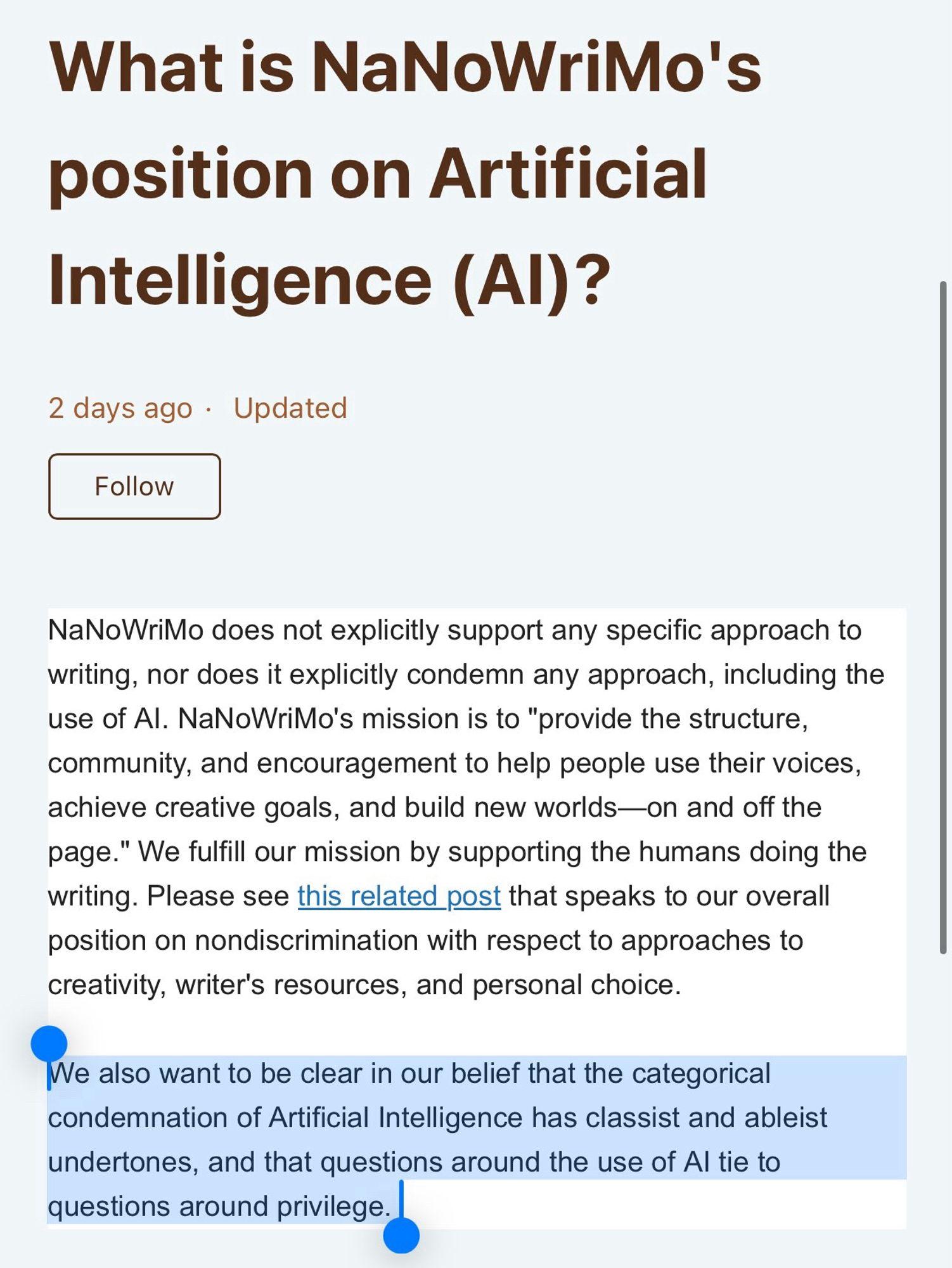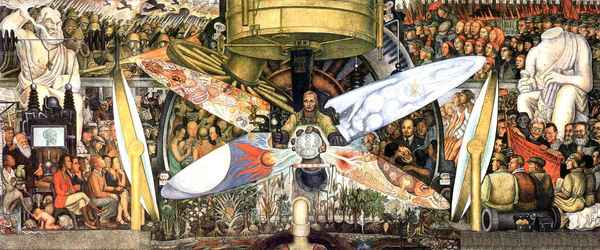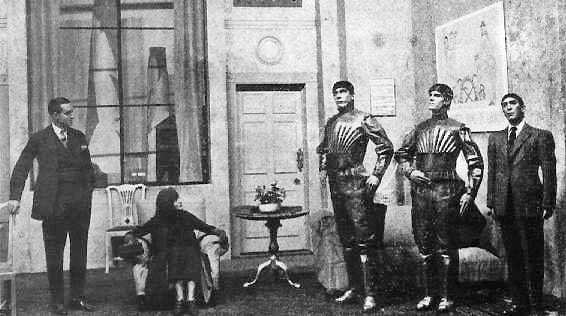The enshitification of NaNoWriMo
This post is migrated from the old Wordpress blog. Some things may be broken.
It’s time to either fork NaNoWrimo, or just put a fork in it. The National Novel Writing Month (NaNoWriMo) has been an online event each November since 1999, spurring would-be and wannabe authors to bang out a 50,000-word draft of something in just 30 days. It’s a brute-force approach to encouraging people to be creative on a deadline and has been popular over the decades. But the focus had classically been on people telling their own stories. Many, many (too many) years ago I’d given it a chance a few times between 2002 and 2005, I think I only ever met the 50k mark once, and it was a mess. I lost that several hard drives ago, but I remember the basic story. It even had an ending. I could possibly re-write it. Or… these days I could just describe it to ChatGPT, let it do the work and rack up the word count. But why?

This year, NaNoWriMo has a new sponsor in the mix, ProWritingAid, a word processor that contains a lot of generative AI tools to either re-write, or just write, for you. The organisation also decided that this was the year to really open the floodgates on AI, and it seems a lot of its current and former devotees, and even some board members of its 501(c) nonprofit, are not impressed. In a possibly unnecessary and definitely poorly crafted post on their site (which seems to have been revised a few times since the blitzkrieg of criticism kicked off), the NaNoWriMo organisers suggest that not only should authors feel free to let algorithms do the ghost writing if they want to, but also that “we also want to be clear in our belief that the categorical condemnation of Artificial Intelligence has classist and ableist undertones, and that questions around the use of Al tie to questions around privilege.” What?
NaNoWriMo has classically been about an ethos of ‘you get out of it what you put into it.’ I think it started going downhill when it went pro and registered as an actual organisation. Historically, it never really paid much attention to what words people were banging into the keyboard. The point was to blast your way past writers block by accepting that the majority of your output could be shit. If you wanted, you could sift through the detritus for any signs of salvageable creative genius in December. And it isn’t a competition between participants. There’s no real incentive to cheat, you’re essentially challenging yourself to meet a word count target within 30 days. It may sound kind of arbitrary, but really all deadlines and word counts are arbitrary and the point was to aim and fire as opposed to dither and worry about the target later.
So there was really no point to clarify what its organisers thought of AI, but they could have clarified it far better. They in their post that “we fulfill our mission by supporting the humans doing the writing.” Well, here’s how you support the humans: encourage them to do their own work. And writing is work. It’s creative and can be fun, it can also be agonising, and is also often a solitary craft. Novels are an expression of human creativity, not the output of a stew of algorithmically mixed, unsalted plagiarism.
Whoever wrote that undated, unsigned post, in hurling claims that critics are being classist and ableist, they were guilty of those two things themselves. Let’s take a quick look at what they wrote.
“Classism. Not all writers have the financial ability to hire humans to help at certain phases of their writing. For some writers, the decision to use AI is a practical, not an ideological, one. The financial ability to engage a human for feedback and review assumes a level of privilege that not all community members possess.”
This assumes that writers should seek to adopt a certain (narrow) voice or style in their writing instead of finding and exploring their own voice. It’s notions like this that drowned out undesirable accents and regional colloquialisms, and caused a number of British schools in the 1950s and ’60s to try to drive out Liverpudlian, Scottish and other accents thought to be lower-class by pushing kids into elocution lessons to get them to “speak “properly.” The range of generative AI is pretty limited and asking it to try to imitate a local or regional accent is begging for trouble. It’s more than likely going to be wrong, and very probably offensive. The idea that trying to mimic a level of privilege is the ideal for something like a messy first draft is to buy into what most schools have long since abandoned themselves.
Irvine Welch’s first draft of Trainspotting was written in standard English. “It seemed almost pretentious,” he said. “People weren’t thinking like that and I couldn’t see their internal thought process beginning like that. They certainly weren’t sounding like that.” It wasn’t until he wrote it back into the “mixed bag that was the Edinburgh scheme vernacular” that it made sense. “And when you see it in art or entertainment, it’s a bit more shocking because you’re not used to hearing these voices,” he said in that interview linked above. Novels are fiction, and while fiction isn’t fact it is supposed to be surfacing some kind of truth (your own). Write what you know or people are going to smell the fraud all over your work. And generative AI is a fraud. It’s a parlour trick. It has no truth, only statistically averaged mundanity. Literature needs more unique voices, rule breaking and expressions that some have grown up with that others will be surprised to learn for the first time. It doesn’t need weird class-paranoid limitations.
On to the NanoWriMo people’s second point…
“Ableism. Not all brains have same abilities and not all writers function at the same level of education or proficiency in the language in which they are writing. Some brains and ability levels require outside help or accommodations to achieve certain goals. The notion that all writers ‘should’ be able to perform certain functions independently … is a position that we disagree with wholeheartedly. There is a wealth of reasons why individuals can’t ‘see’ the issues in their writing without help.”
So, this is crap on several fronts. I can’t spell for shit on the fly. I use strange grammar, sometimes on purpose, but not always. Most writing software and computer operating systems tell you when a word is spelled wrong or the grammar seems off. It lets you know if you put a ‘their’ where there should be a ‘there.’ Beyond that, we start getting into craft, by which we again mean style and voice: your voice. And again, this is NaNoWriMo, not fucking HarperCollins. The goal is to bang the keys fast and furious and worry about typos and split infinitives later.
That aside, a generative AI bot is going to be the worst writing coach you’ll ever find. It’s not helping you express yourself, it’s showing what average sentence structure looks like. If you’re writing a technical manual, that may come in handy. But a novel is not where people turn to for statistically probably sentence structures and narrative flow. Generative AI has a large corpus of text from which it can derive some output, but it can’t tell you how to sound like you. It can’t come up with something great that no one has done before. That’s struggle. That’s where you grapple with the words. It’s a fight in a text editor with yourself.
Under the guise of countering “ableism” there is again this presumption that a writer’s use of language is a disability if it falls outside of certain norms and standards regardless of context, and again we have this appeal for people to homogenise themselves, which is exactly what a generative AI is good at.
There are lots of problems and angles to go with the above defence of AI to counter ableism, take your pick. I think the aspect of proficiency in a “chosen language” stands out. Yes, many authors choose to write in languages other than the one they learned from birth. The best authors bring their own voice into it. Nigerian author Chinua Achebe chose to write his masterpiece ‘Things Fall Apart‘ in English, but not the colonialist language, rather one that heavily incorporated the Igbo oral tradition, phrases and many words. In an interview on this, he had said “I feel that the English language will be able to carry the weight of my African experience. But it will have to be a new English, still in full communion with its ancestral home but altered to suit its new African surroundings.” Writing is experimenting with the tools you’ve got and seeing where you can take them. There is a kind of ableism in the NaNoWriMo argument suggesting that people consider their own voices as flaws and cover them with a gauze of machine generated blandness.
A lot of people with disabilities are not plussed by NaNoWriMo’s leveraging ableism. I’ll leave it with a quote by someone I saw on Mastodon, who posted: “they’re defending letting you use AI to plagiarise yourself to 50,000 on the basis that disabled people need AI. … I have a cognitive disability that makes it very difficult for me to write and I am FURIOUS.”
Cory Doctorow may have coined ‘enshitification‘ to refer to degradation of digital services over time as they try to squeeze as much profit as they can out of them, but NaNoWriMo certainly seems to fit the bill even if it’s not some Silicon Valley startup. The sad part is that it had something kind of fun, quirky popular, and uniquely of the web itself. And then it got sponsors. They should behave like the best writers do: get paid and say things like they’re never going to pay you again.




